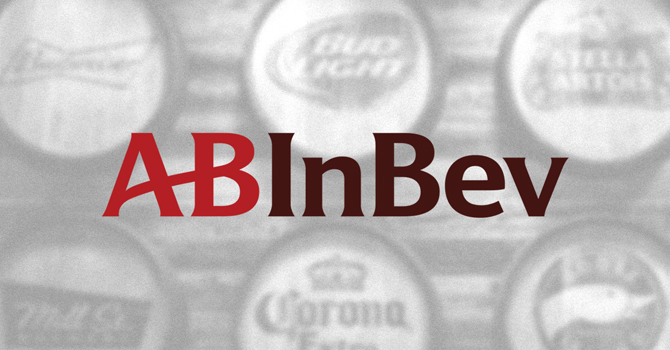
Anheuser-Busch InBev today reported 2018 global revenue growth of 4.8 percent — to more than $54.6 billion — despite continued declines in the U.S.
Nevertheless, global volume for the world’s largest beer manufacturer grew 0.3 percent last year.
In the U.S., A-B reported that revenue declined 0.7 percent in 2018, despite revenue per hectoliter growing 1.9 percent. The company’s sales-to-retailers and sales-to-wholesalers declined 2.6 and 2.7 percent, respectively.
Those declines were in large part due to the company’s faltering flagship lager brands. In 2018, Budweiser lost 35 basis points of market share, while Bud Light lost 85 basis points of share.
Nevertheless, A-B InBev CEO Carlos Brito told investors and analysts that the company’s U.S market share trends — which declined an estimated 40 bps in 2018 and 20 bps in Q4 — were its best since 2012. He credited the improved market share trends to changes in the company’s sales strategy and the success of premium offerings such as Michelob Ultra, Bon & Viv Spiked Seltzer and craft beer brands, as well as new products such as Michelob Ultra Pure Gold, Bud Light Orange and the Budweiser Reserve series. In fact, Brito said A-B’s innovation beers last year accounted for half of the overall U.S. beer industry’s innovation volume.
Revenues for A-B’s global priority brands — Budweiser, Stella Artois and Corona, which A-B owns outside of the U.S. — increased 9 percent in 2018. Those three brands now represent more than 20 percent of the company’s total revenue, Brito said.

During a call with investors and analysts, Brito focused on A-B’s premiumization strategy, which he called its “single biggest opportunity for growth.”
Speaking to the potential future opportunity of premium brands, Brito noted that worldwide disposable income is expected to nearly double over the next 13 years to about $43 trillion. He added that the premium beer segment is expected to grow to 220 million hectoliters by 2020.
“The segment is expected to grow about five times faster than the core and value segment, and based upon our experience, it’s a very profitable segment, driving about two times more revenue for every hectoliter sold,” he said.
Last year, A-B’s “High End Company,” posted revenue growth of 18.3 percent, while venture capital arm ZX Ventures delivered 10 percent of the company’s top-line growth, Brito said. Meanwhile, craft and specialty brands posted “double-digit revenue growth,” he added.
Brito added that the “High End” offerings, including brands such as Stella Artois as well as global and domestic craft beer companies, is A-B’s “No. 1 growth engine.” The High End accounted for 30 percent of the company’s worldwide revenue growth and 10 percent of its total revenue in 2018.

Brito also shared that A-B’s no- and low-alcohol portfolio of brands now accounts for 8 percent of the company’s worldwide volume.
According to Brito, A-B is on pace to meet its goal of making no- and low-alcohol offerings 20 percent of its beer volume by 2025. In fact, no- and low-alcohol offerings now make up more than 20 percent of the company’s beer volume in six markets — Australia, China, Ecuador, Colombia, Panama and Honduras.
Asked about the opportunity for those offerings in the U.S., Brito said America “is part of our plan for sure.” In fact, the company has begun test marketing “Budweiser 0.0” in some U.S. markets, after a trial run in Canada.
“I think for sure the U.S. will also follow that trend,” he said.
As for last week’s acquisition of ready-to-drink cocktail maker Cutwater Spirits, Brito said the company took a page from the ZX Ventures’ playbook, entering the spirits category “from a disruptive angle.”
“If we’re entering spirits in a more serious way, we don’t want to enter trying to do a me too-type brand,” he said. “We’re entering with a craft mindset.”
In addition to full-year earnings, A-B released its fourth-quarter results Thursday, highlighted by a 5.3 percent in global revenue. A-B’s worldwide volume increased 0.3 percent in the period.
However, in the U.S., fourth-quarter STRs declined 2.8, while STWs dipped 0.1 percent. Nevertheless, Brito said the company experienced “some acceleration” in Q4, noting its market share loss was 20 bps.
As of press time, A-B stock was trading at $78.34, up more than 4 percent.
Clarification: This post has been updated to reflect that Brito was referencing the company’s “High End” offerings, and not the the company’s split off High End division.
